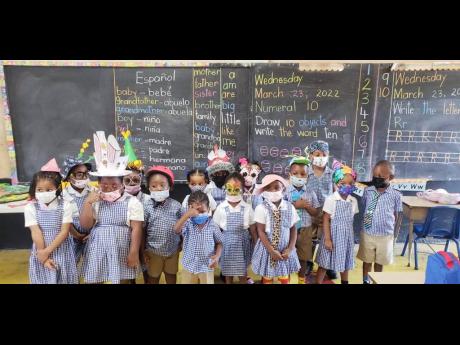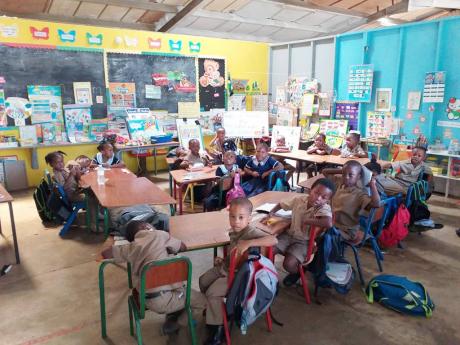Hanover, St James, Westmoreland basic schools shine
ECIs with perfect score reveal winning formula
WESTERN BUREAU:
Early childhood institutions (ECIs) within Region Four have the highest ratio of compliance with industry benchmarks, outpacing the rest of the island, and educators have credited consistency for the achievement.
With a compliance rate of 22 per cent, Hanover, St James, and Westmoreland boast 398 of the 2,373 schools registered with the Early Childhood Commission (ECC). The region also recorded the lowest ratio of schools scoring below 50 per cent, an indication that they may have found the winning formula.
Eighty-three of the schools in the region achieved 100 per cent inspection scores, while 24 scored between 83 and 99 per cent, and 52 between 70 and 84 per cent.
The remaining 126 institutions scored from a low of 50 to a high of 69 per cent.
They excelled in the 12 national standards, which include staffing, developmental/educational programmes, interactions and relationships with children, indoor and outdoor equipment, health, and nutrition.
Those achievements contrast with the gloomy outlook across some parishes like Portland, St Mary, and St Thomas, where more than 70 per cent of ECIs recorded failing grades. More than 1,000 ECIs nationally are in grave deficit.
“It is the monitoring. The ECC officers are helpful and their type of supervision is constructive,” said Doreth Chambers, principal of Hosanna Preparatory in Montego Bay, lauding the persons who keep her and fellow educators on their toes.
“There is also an open chain of command and consistency, so if I slip up, they follow up. They understand that it takes a lot to be compliant.”
Her school, which scored 100 per cent, has remained a high achiever.
Chambers said that Hosanna makes the sacrifice to attend training sessions, qualify in first aid, and to ensure that staff have clean police records.
She said that the lifetime training to ensure certification benefits the students, who are offered safe classrooms, proper playgrounds, and an environment that is conducive to learning.
Chambers’ colleague in Hanover, Patricia Palmer, who is acting principal of Chester Castle Primary and Infant, acknowledged that her school could not have excelled without the community’s involvement. Their weekends didn’t belong to them, she said, as they used them to complete the requirements.
“It didn’t matter what department the parents had children in. We all worked together and had the determination to achieve all 12 standards,” the acting principal said.
“The team worked together and the theme was to get it done. It’s a sense of achievement. We know we can’t idle or take it for granted; we have to maintain it.”
Palmer credited her predecessor, former principal Tiffany Grant-Smith, for fostering the culture of collaboration.
The school has a population of 202. The infant department has 45 of that number
Over in Westmoreland, Happy Hearts Early Childhood Institution’s Helen-Ann Clarke says her school has scored 100 per cent compliance for its second consecutive assessment.
“I do not have a lot of money, so I work bit by bit, and I spend wisely. Even before the standards, if there was one piece of board that needed to be changed in the school, it was done immediately,” said Palmer.
She recalled that when the ECC developmental officer checked a classroom and said that an additional window was needed, she quickly replaced it the following day.
“I credited the goods,” said Clarke, emphasising the good relationship she has with a hardware store.
Happy Heart, which is located in Negril, has 94 students and eight teachers.
Clarke said that charities such as the Rotary Club and Sandals Foundation, as well as Swept Away Hotel, are her go-to sources for school supplies.
“We were the first to implement the flexiglass in any school in Westmoreland when the COVID-19 pandemic hit. Students were in their own cubicle, so when the public relations officer from ECC came, she took photos and posted them to their website, lauding us,” she said.
Heartened by the impact their work has had on early childhood education in the country, senior inspector Faithlyn Lyle said there were two notable factors that will impact the outcome of certification. These areas include school leadership and funding from donor agencies.
The majority of principals and practitioners of ECIs in Region Four, she said, are receptive to the processes of the ECC, and most are desirous of obtaining certification status.
“Funding is a key factor for most of our ECIs since some institutions are not able to financially do all that needs to be done to acquire certification. As a result, the ECC seeks funding from donors such as CHASE, Usain Bolt Foundation, United Way of Jamaica, PACE Canada, Union of Jamaican Alumni Association (UJAA), among others, to assist the ECIs. There are also donors that engage the ECC and share how they would like to assist institutions,” said Lyle.


